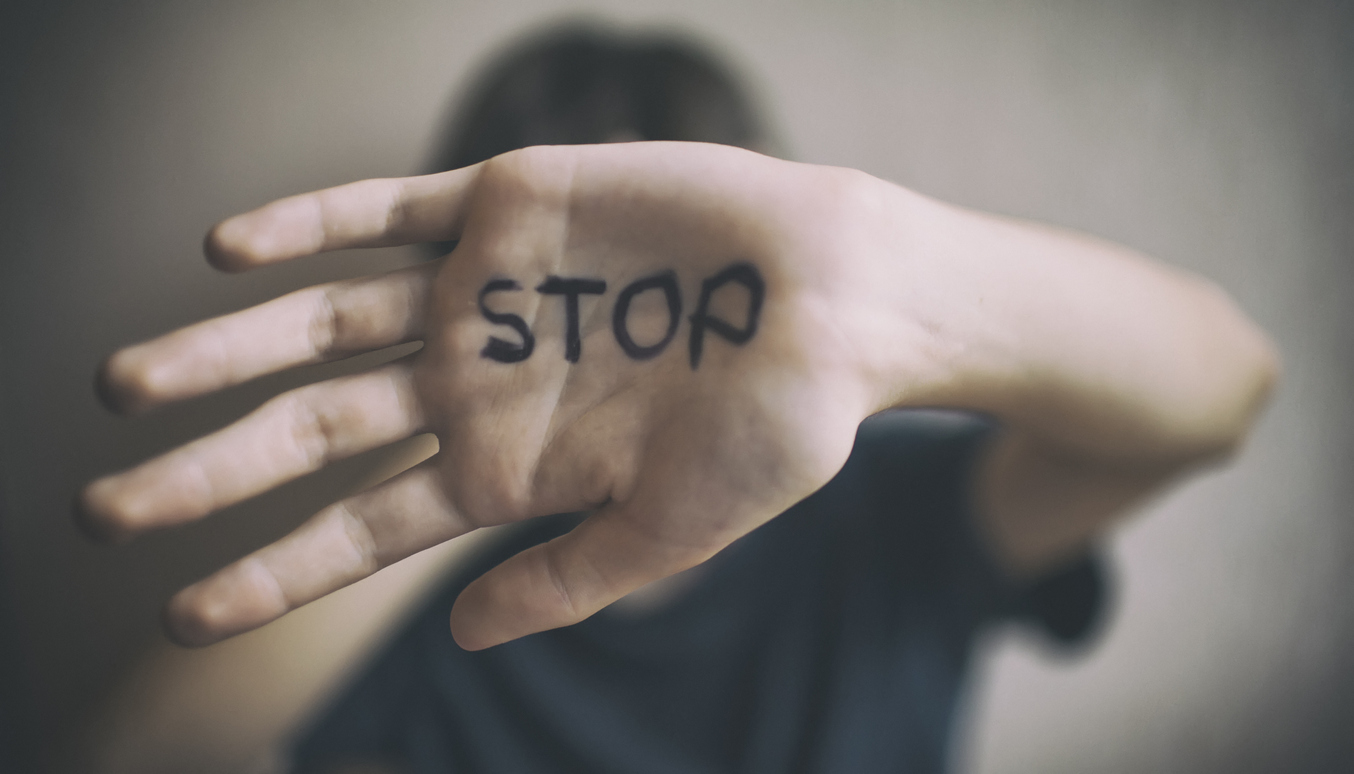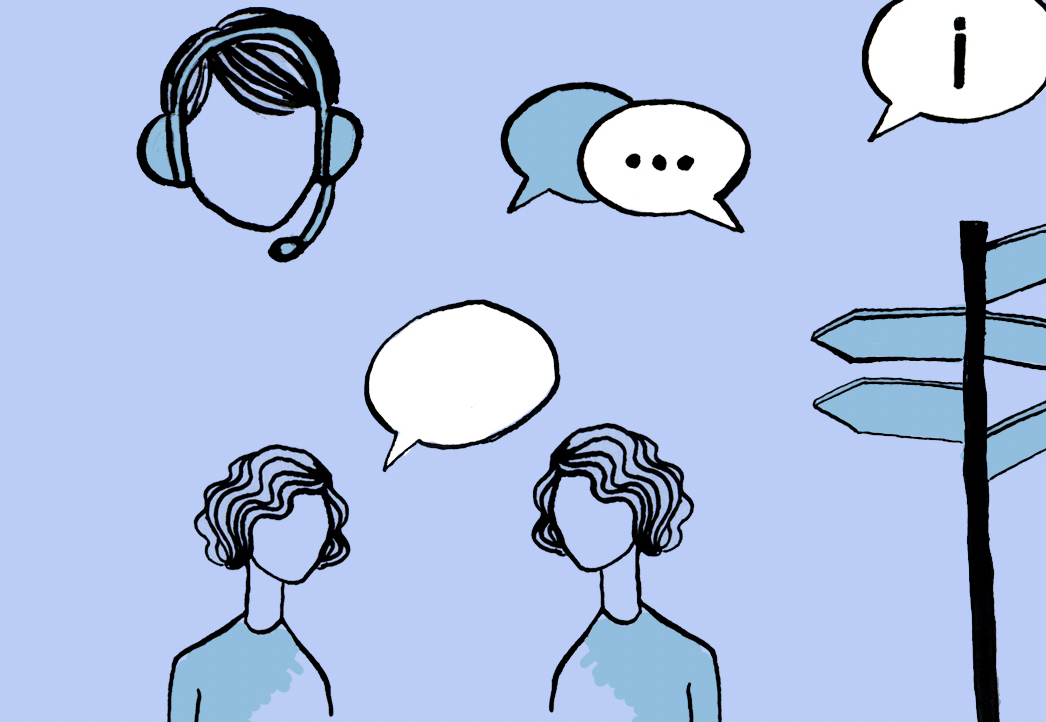Domestic & Familial Abuse, 'Honour'-based Abuse, Forced Marriage, Stalking and Harassment
If you are experiencing abusive behaviour, it is important to remember that the abuse is not your fault, that domestic abuse is against the law, and that you don't have to deal with this on your own because there is a lot of support available.
On this page we explain:
- how to recognise the signs of domestic abuse
- different types of domestic abuse according to individual circumstances
- how to recognise the signs of stalking and harassment
- what to do if you are a victim of domestic abuse, stalking or harassment
- the confidential support we can offer you at Queen Mary
- external specialist support options - for a full list of organisations, see Queen Mary's Report and Support web page
- where to get support if you have been a victim of sexual violence
What is domestic abuse?
Click to leave the site immediately
Domestic Abuse is any incident or pattern of incidents of controlling, coercive, threatening behaviour, violence or abuse between those aged 16 or over who are, or have been, intimate partners or family members regardless of gender or sexuality. The abuse can encompass, but is not limited to:
- Psychological

- Physical
- Sexual
- Financial
- Emotional
Controlling behaviour is a range of acts designed to make a person subordinate and/or dependent by isolating them from sources of support, exploiting their resources and capacities for personal gain, depriving them of the means needed for independence, resistance and escape and regulating their everyday behaviour.
Coercive behaviour is an act or a pattern of acts of assault, threats, humiliation and intimidation or other abuse that is used to harm, punish, frighten, isolate or create dependence.
The term domestic abuse can refer to a range of behaviours including harassment, stalking, rape, sexual assault, female genital mutilation, forced marriage, so called 'honour'-based abuse, gender-based violence and LGBTQ+ abuse. You can find further specific information about these on the Queen Mary Report and Support pages.
Anyone can experience domestic abuse and whatever you want to do, there are organisations that can give you advice and help. Although every situation is unique, there are common factors that link the experience of an abusive relationship. Acknowledging these factors is an important step in preventing and stopping the abuse. Women’s Aid have produced a list to help you recognise if you, or someone you know, are in an abusive relationship.
If you are experiencing abusive behaviour, it is important to remember that the abuse is not your fault, that domestic abuse is against the law, and that you don't have to deal with this on your own because there is a lot of support available.
'Honour'-based abuse
So called ‘honour-based’ abuse includes incidents or crimes involving violence, threats of violence, intimidation, coercion or abuse (including psychological, physical, sexual, financial or emotional abuse) which have or may have been committed to protect or defend the honour of an individual, family and/or community for alleged or perceived breaches of the family and/or community’s code of behaviour.
The abuse can include virginity testing and hymenoplasty (the reconstruction of the hymen) as a precursor to forced marriage. These practices are degrading and intrusive and are often traumatising for the victim. Failure of the ‘test’ can result in disownment from the community or even honour killing. In 2022, the UK government’s Health Care Act made it illegal to carry out these practices or help someone else undertake them. It also illegal for UK nationals or residents to travel abroad to do these things outside the UK.
Karma Nirvana is a specialist charity for victims and survivors of honour-based abuse. As well as running a national helpline on 0800 599 9247 you can call if you need advice, they have produced a short film The Virginity Myth: https://youtu.be/T0h3QZLRQKQ?si=4CxgaM_3ZDJnAViR which explains more about the cyclical nature of honour-based abuse.
Forced marriage
This refers to a marriage in which one or both spouses do not (or, in the case of some adults with disabilities, cannot) consent to the marriage and duress is involved. Duress can include physical, psychological, financial, sexual and emotional pressure.
A forced marriage is different from an arranged marriage. In an arranged marriage the families are involved in finding the partners, but the spouses still have a choice about whether the marriage goes ahead. Consent is a prerequisite to Christian, Hindu, Muslim, Sikh and Jewish marriages.
Forced marriage is violation of human rights, as well as a form of domestic violence. The Forced Marriage Unit have produced a handbook for survivors. Rights of Women have created a number of fact sheets.
LGBTQ+ abuse
This term describes domestic abuse based on a person's orientation or gender identity where the abuser uses the victim's sexuality and gender identity against them as a means of manipulation and control. The abuse can take the form of threats to disclose sexual orientation, gender identity or HIV status to family, friends or work colleagues, pressure to keep your identity/orientation secret, denying the existence of abuse within LGBTQ+ relationships, isolating you from the LGBTQ+ community, and making you believe there is no help available to LGBTQ+ victims. Abuse from family members may be minimised as a 'family dispute' or you 'having different values'.
If you are a victim or survivor of LGBTQ+ abuse, you can call Galop's National Helpline on 0800 999 5428 to get confidential advice and support, including on emergency housing options and navigating the criminal justice system.
Harassment and Stalking
Harassment generally refers to a pattern of behaviour that can cause distress or alarm to someone which can include unwanted contact, threats, or other behaviours that are meant to intimidate or annoy the person. Examples of harassment could be:
- sending abusive text messages
- posting abusive content/messages online
- spamming and sending viruses
- cyber flashing, threatening to share private photos
- repeated anti-social behaviour
- making unwanted or offensive telephone calls
Stalking involves a more targeted and persistent pattern of behaviour that can cause significant distress or fear. This can include all of the above, but also following or monitoring someone's activities, in person or online. Stalking can be seen as a more severe form of harassment, often described as fixated, obsessive, unwanted and repeated behaviour, which engenders alarm and distress in the victim or a fear of violence. Examples of stalking include:
- unwanted following, watching or approaching the victim in their home, workplace or place of study
- sneaking into the victim's home, workplace or place of study
- using/installing technology eg. hidden cameras, computer tracking software, hacking online accounts to spy on the victim
- sending unwanted messages by phone, by text
- persistent telephoning, or telephoning then hanging up
- sending or leaving unwanted gifts, letters, flowers
Whilst harassment may stop if an issue or dispute is resolved, stalking is less likely to cease without legal intervention. This is because stalking typically arises as a result of the perpetrator feeling rejected, most commonly after a relationship had ended. Other stalker typologies relate to seeking intimacy, feeling incompetent, resentful or predatory.
What can I do if I think I'm being stalked?
If you have concerns that you are being stalked, or you are worried about someone's obsessive behaviour towards you, according to the Alice Ruggles Trust you should:
- Call the police on 999 in an emergency
- Tell people - reach out to a friend, family member, tutor
- Keep a diary
- Vary your routines
- Be cybersecure
Take a look at the Trust's web pages for more advice and support you can access both over phone and online.
How can the Advice and Counselling Service help?
Practical advice
You can contact us confidentially to arrange to see a Welfare Adviser, who can offer you advice and guidance with practical issues. It is important to understand that Welfare Advisers will always work from your point of view; they will not impose any decisions on you. The adviser will help you to understand what options are available at Queen Mary, for example how to find alternative accommodation if you wish to, and how to access financial support. The adviser can also help you access specialist external support for independent, confidential advice and information.
We can work with you whatever stage you are at – you may be living in a situation of domestic abuse or forced marriage and wanting advice about your options if you choose to leave, and how to plan for leaving safely. Or you may have already left. Or you may not have experienced domestic abuse or forced marriage yet but are at risk. We can support you in any of these situations.
Also, if your situation is adversely affecting your studies, we can advise you about academic options such as submitting a claim for Extenuating Circumstances if you have been unable to attend exams or discussing whether you want to take time out of your studies.
Advice around your emotional wellbeing
If you would like confidential 1:1 support from a counsellor around the difficult emotions you may be experiencing as a result of domestic abuse or forced marriage, or fear that you are at risk of these, do not hesitate to contact us.
Specialist advice from a Queen Mary SAHA (sexual assault and harassment adviser)
Queen Mary also has a dedicated SAHA team who offer specialist advice and support to any student who has experienced sexual violence. The SAHA web page explains more about how they can help.
What other support is available?
In an emergency you should call the Police on 999 (you do not need a signal or credit to do so). We would also encourage you to call the 24 hour free and anonymous National Domestic Violence helpline on 0808 2000 247. Karma Nirvana is available for anyone affected by honor-based abuse; you can reach their helpline at 0800 599 9247 (Monday to Friday 9.00 am - 5.00 pm). Additionally you can contact the Forced Marriage Unit for assistance in stopping or leaving a force marriage.
Queen Mary's Report and Support web pages have more information about specialist external organisations you can contact for support around domestic abuse, forced marriage, honour-based violence, stalking and sexual harassment and violence
The full list of specialist support organisations you can contact is here.


